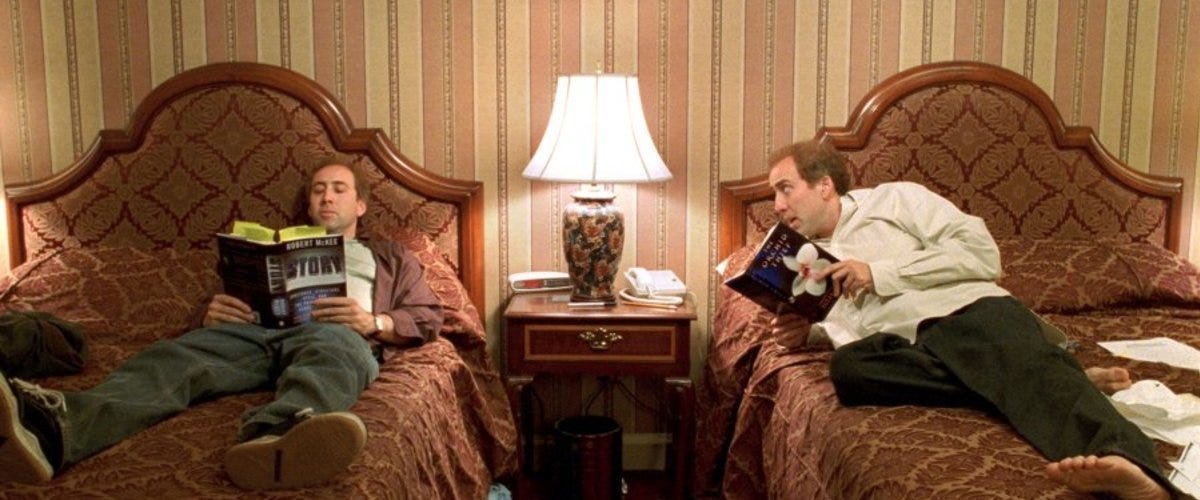🙃 Making unnecessary and possibly horrible changes
Can you say no when you see a problem with the notes?
This week’s rebroadcast looks at the challenge of acting on notes that you don’t agree with.
I’m a struggling screenwriter in Brazil. About one and a half years ago, I had my first screenplay produced, a drama/thriller that had mixed reviews. The large part of the negative reviews pointed to aspects of the screenplay that I was forced to modify in the course of the production. In all, I like the result, but I think it would be better if my fourth draft (not my fifth) would had been the basis for the movie.
Now, I am having similar problems with my new screenplay in pre-production. This time, it is a child adventure that is very close to my heart, a story about ghosts and divided families. I have a very tight screenplay that is focused in the protagonists. It’s a story about a family of ghosts that is trapped in a house, each member enclosed in a separate room. Three young heroes tries to broke the curse that binds them there. Because of this, the plot is mainly focused inside the house, with a little touch of claustrophobia. Now I have the studio which is banking the project demanding the adding of new subplots. But I fear that the added subplots will loosen the narrative.
My question is: What you do when you truly think that your story don’t need to have new plots, but you have to add them anyway? How can I cut to external situations without weakening my main story?
— Sylvio
You’re facing exactly the situation Hollywood writers find themselves in on almost every job. You have the draft you think is ready to shoot, but other powerful forces are pushing for more changes. Sometimes the changes come out of necessity — they simply can’t afford to shoot that sequence. But more often, the changes feel arbitrary. “We need more monkey jokes. Everyone loves monkeys.”1
So what should you do?
Lick you finger and see which way the wind is blowing. If there seems to be a consensus that more monkey jokes are needed, then add them. And don’t add half-assed monkey jokes in the hopes that they’ll fail and get cut later, because screenwriter karma dictates that the worst things you write will always get prominently featured in the trailer. So make them good monkey jokes.
Am I seriously advocating selling out?
Yes, for you Sylvio, because with one produced credit you don’t have a lot of hand to be saying, “Absolutamente no.” If making the changes will completely undermine the movie, your job is to get the other decision-makers (director, producers) to realize this. The best way to do it is to write the changes as well as you can, and present them with your reservations, explaining in advance how hard you tried, what works and what doesn’t.
There is a small but real danger that they will disagree and shoot your revisions. But your version is no doubt better than what the director or another writer would have come up with.
Coincidentally, I’m going through the same thing right now on a project I’m writing. I’ll be spending three days doing revisions I’m pretty sure won’t work, but that’s the best way to demonstrate to everyone why they won’t work. The silver lining is that the process of doing these failed revisions may inadvertently create some good material that will be helpful in other parts of the script.
In your specific case, I’d make sure that whenever you’re cutting to external situations, you’re using the cuts to increase the overall energy. Make sure you’re leaving the house with a question unanswered, and returning to the house with something changed.2 You’re probably using claustrophobia to create tension, but there are many other tools in a writer’s arsenal. (Also, we’ll notice the enclosed spaces more if we’ve had some contrast.)
Good luck.
Are you enjoying this newsletter?
📧 Forward it to a friend and suggest they check it out.
🔗 Share a link to this post on social media.
🗣 Have ideas for future topics (or just want to say hello)? Reach out to Chris via email at inneresting@johnaugust.com, Mastodon @ccsont@mastodon.art, or Threads @ccsont@threads.net
This is true, up to a certain threshold. More than three monkeys, and I start to get nervous. You’re getting into monkey gang territory, and working together, they could probably take down a grown man.
Consider how Lost uses its flashbacks/flashforwards. They’re interrupting the flow, but they’re goosing the overall energy.




